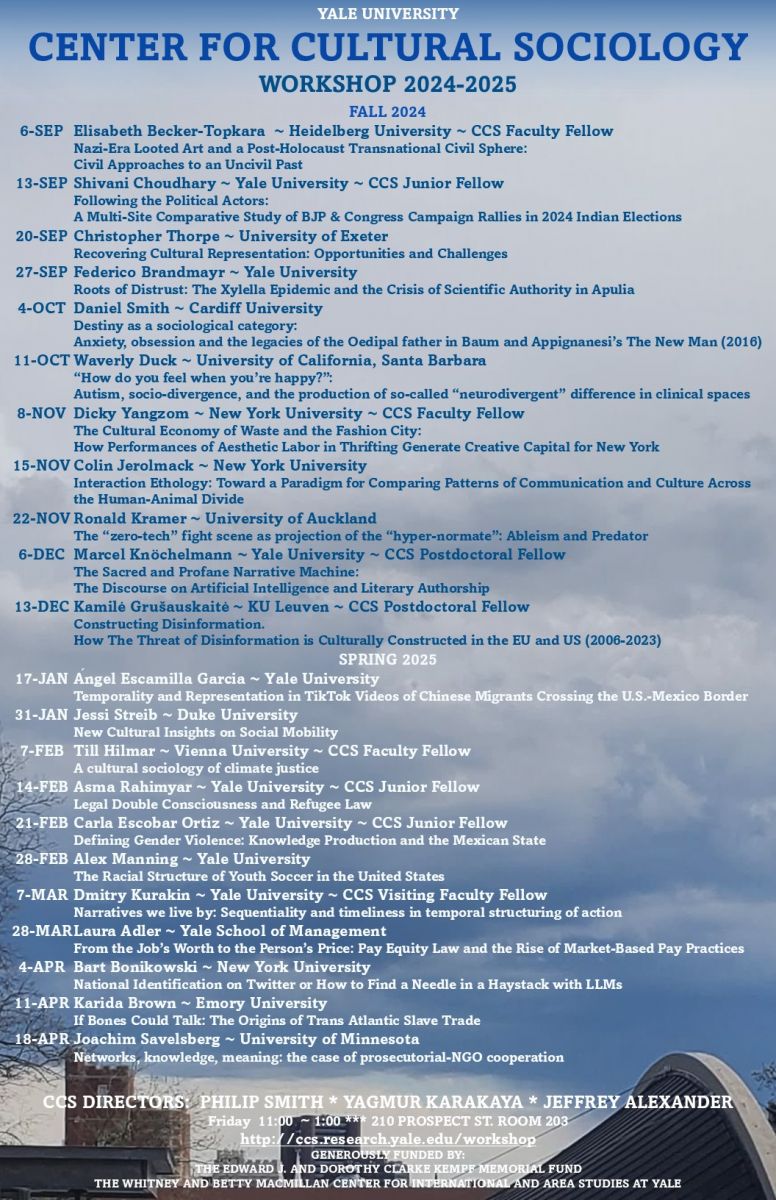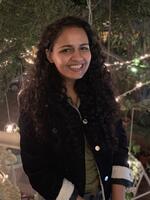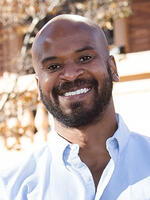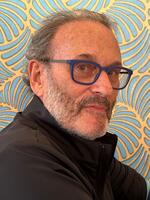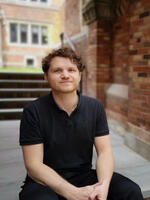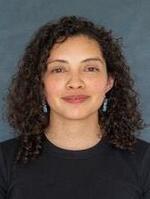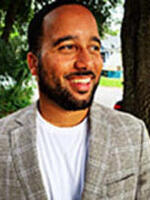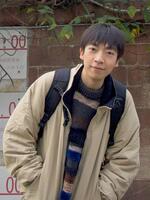Max Weber Institute for Sociology, Heidelberg University ~ CCS Faculty Fellow
Nazi-Era Looted Art and a Post-Holocaust Transnational Civil Sphere: Civil Approaches to an Uncivil Past
|
Yale University ~ CCS Junior Fellow
Following the Political Actors: A Multi-Site Comparative Study of BJP & Congress Campaign Rallies in 2024 Indian Elections
|
University of Exeter
Beyond Said and the Saidian Paradigm: Towards a Strong Program account of cultural representation
Abstract: This paper calls and makes the case for a Strong Program account of cultural representation. Such an account is intended as a corrective to the hegemony of Said-inspired understandings and studies of cultural representation, which blind sociology to the symbolic significance of the cultural other as a force for ‘social good’, for generating solidaristic forms of intra- and inter- relations and identities, challenging the interests of dominant institutions and the State, and driving progressive social and political change. To demonstrate these claims, the first part of the paper delineates the central concerns and theoretical structure of Said’s Orientalism, before turning to discuss the book’s wider significance for the development of the ‘Saidian Paradigm’, the dominant and paradigmatic approach to the study of cultural representation to develop in its wake. The second part of the paper demonstrates how Strong Program thinking and resources can be used and adapted to explain changes to the symbolic meanings and moral purification of collective representations of Italy and the Italians in England and Britain during the decades spanning approximately the 1820s to 1860s. The Italian case is a highly instructive one for demonstrating the capacity of Strong Program thinking to bring into view problematics, phenomena, and processes that remain scarcely conceived when viewed through the limiting lenses of Said-inspired studies of cultural representation. The paper concludes by reflecting on the gains that stand to be made from developing a Strong Program account of collective representations of the cultural other, an account capable of retaining the strengths, while going beyond the limitations of, Said-inspired understandings and studies of cultural representation.
|
Yale University ~ Lecturer of Political Science and Sociology
The Left and the Right in the Ethnographic Imagination
Abstract: In the study of political phenomena, social scientists are increasingly turning to ethnographic methods, contributing to the rapid growth and widespread appeal of political ethnography. More than researchers using other methods, political ethnographers face dilemmas about finding the appropriate distance with their subjects. Being too close can turn an ethnographer into a cheerleader, but being too far comes with the risk of othering and essentializing complex human beings. When they make decisions about research design, fieldwork, and writing, political ethnographers consider the expectations their peers have about the correct distance to establish with informants, which are learned in training and informal interaction. This appropriate distance, however, is not the same for all types of informants. Informants that are seen by the prevailing assumptions of the knowledge community as morally polluted, such as right-wing activists, require a greater distance than subjects that are morally sacred or neutral. The article analyzes how political ethnographers use a variety of “distancing devices” to manage how readers perceive the distance they establish with their informants and preempt political and ethical challenges to their work. It does so by drawing on a content analysis of 82 ethnographic articles about left-wing and right-wing groups published since 1998. Overall, the results confirm the existence of profound asymmetries in how distance is constructed between the two types of informants.
|
Cardiff University
Destiny as a sociological category: Anxiety, obsession and the legacies of the Oedipal father in Baum and Appignanesi’s The New Man (2016)
Content warning: This week’s paper reflects on the meaning of fate for a democratic society, but the case study material covers some subject matter that some may find upsetting. The film is about two new parents and covers their experience of child loss. Despite its upsetting nature, the overall experience and message of the film is an uplifting and consoling one.
Abstract: When Georg Simmel suggested that destiny should be considered one of life’s a priori categories, one of his more niche, but properly sociological, claims was that fate could form the basis for the possibility of a democratic society. Conceiving of fate or destiny as contingent calamities that befall us which nevertheless answer our innermost life purpose, Simmel’s initial thought is that random misfortune is one thing universal to us all. This paper attempts to explain why Simmel’s thinking on this matter is correct. By first tracing how Simmel’s Fate finds its conceptual analogue in Freud’s theory of anxiety, the paper then explores the auto-fiction film The New Man, directed by two London based artists and academics, covering their experiences of becoming parents and, as fate had it, their experience of child loss. The reading put forward is overdetermined: one, the filmmakers are not only Freudians in outlook, but, two, they’re also intimately connected to the social milieu of Freud’s cultural and intellectual legacy in London’s artistic and intelligentsia circles. My reading is that Freud’s psychoanalytic theory is at once a means of explaining how to think of life’s calamities as fateful in a post-Fate world, and something we should take responsibility for, and consider meaningful. For the problem of a post-Fate society is not so much that we don’t know our fate but rather that we’re in the dark about its meaning and ultimate purpose in our life trajectory. Considering this film, where calamity and a mythology of Fate (otherwise called the Oedipus complex) are overdetermined, I argue the lessons of how to think of fate as sociological universal are presented for us all.
|
University of California, Santa Barbara
“How do you feel when you’re happy?”: Autism, socio-divergence, and the production of so-called “neurodivergent” difference in clinical spaces
Abstract: In recent years, the terms “neurodivergent” and neurobiological” have become increasingly popular ways to describe differences between autistic people and so-called “neurotypical” people. The intent is to communicate that autistic brains are not disordered, but simply wired differently, and that they are a naturally occurring form of human variation. While we agree that it is important to treat autism as difference rather than deficit, the terms neurodivergent and neurobiological nonetheless locate autistic challenges within individuals, rather than in the social interactional environments where such divergence is constructed. In this paper, we argue that autism, like other social identities, is a social fact assembled in interaction, where interactional trouble becomes the basis for attributions of neurological difference. To call attention to the irreducibly social dimension of autism, we introduce the terms “socio-typical” and “socio-divergent”, to emphasize the deviation from “commonsense” expectations that is constitutive of autism as a social phenomenon. Examining interactions between children and clinicians at a clinic specializing in autism diagnosis, we show how socio-divergent interactions are used as evidence of neurodivergence, such that co-produced atypical features of the interactions become the responsibility of the child alone. Furthermore, we argue that this process of individualizing autism is built into the Interaction Order of the clinic, which treats interactional trouble as accountable in terms of personal pathology. Finally, we discuss the implications of our social constructionist approach for the study of autism, identity, and the stigma that can arise when non-socio-typical ways of sensemaking are treated as signs of neurobiological disorder.
|
|
|
Yale University ~ CCS Faculty Fellow
Learning to Thrift: Overcoming stigma of used-clothing in second-hand fashion
|
New York University
Introduction - Erving Goffman, Thomas Sebeok, and “Interaction Ethology”
Co-authored with Gary D. Jaworski, Independent Researcher
Abstract: Social scientists have only recently begun to explore how Erving Goffman’s intellectual trajectory was influenced by his engagement with animal ethology, and even less is known about Goffman’s relationship to the network of scholars working at the intersection of human and animal communication that coalesced in the 1960s and 70s. Relying on an archive of over two dozen correspondences recently made available from the University of Indiana archives, this paper examines Goffman’s personal and working relationship with the founder of “zoosemiotics,” Thomas Sebeok, which lasted over twenty years and included organizing a major international conference on “Interaction Ethology” that brought together ethologists, linguists, and anthropologists. These materials bolster the case that Goffman was captivated by the postwar growth of animal ethology throughout the course of his career and shed light on his broader ambitions to curate a school of human ethology grounded in the naturalistic study of everyday interaction and the inductive discovery of “the rules and practices which organize co-mingling.” Goffman was at pains, the letters reveal, to distinguish interaction ethology from sociobiological approaches to human ethology, which ultimately came to dominate the field.
|
University of Auckland
Abstract: Drawing from literature on the concept of ableism and its intersectional qualities, this article provides an interpretation of the zero-tech fight scene. A recurring motif of much popular culture, zero-tech fight scenes are witnessed when protagonists for “good” and “evil” cast weapons (technologies) aside and engage in hand-to-hand combat. Positioning the 1987 film Predator as archetypal, three claims concerning the political-cultural significance of zero-tech fights scenes are advanced. First, such scenes project images of “hyper-normality” that assume and reproduce the cultural authority of ableism. Second, and closely related, zero-tech fight scenes denigrate disability by symbolically linking it to dependency, cheating, untrustworthiness and dishonorable conduct. Third, and following from notions of intersectionality, the article explores how zero-tech fight scenes are not reducible to their ableism. As with other “-isms,” ableism exerts force by tapping into a range of harmful ideological frameworks, such as racism, classism, sexism, transphobia, and so on. This aspect of our interpretation is advanced by showing how the ableist logic that underpins Predator is fortified by the logics of racism and speciesism.
|
Yale University ~ CCS Postdoctoral Fellow
Drama of Reason or Unreasonable Drama?
Discourse Ethics and Civil Sphere Theory in Tentative Agreement
|
Yale University ~ CCS Postdoctoral Fellow
Abstract: From loose speculations that Western political leaders were involved in 9/11 or the ‘fake’ moon landing to theories like QAnon and The Great Reset, conspiracy theories have spread rapidly over the past few decades. Today, such conspiracy narratives about power and secrecy are increasingly produced and consumed on social media platforms. These spaces are not only forums where people consume conspiracy theories – they are productive grounds for the negotiation of symbolic boundaries and social identities. Yet, while scholars have studied and emphasized the diversity of conspiracy culture(s) they have not addressed the dynamics of how these diverse groups are formed and consolidated in and through their communication. In this article, we seek to address a critical gap and ask: how do people in online Great Reset communities construct their collective identities through symbolic boundary work across social media platforms? In answering this question, we analyze interactions and communication in the ‘Great Reset’ conspiracy subculture across six social media platforms: Facebook, Instagram, Twitter, YouTube, Reddit, and TikTok. Empirically, this paper contributes to fleshing out the nature of conspiracy ‘talk’ across six platforms – particularly mapping the discourse about the ‘Great Reset’ across platforms. Theoretically, this paper contributes to understanding how the communicative process shapes the identities of conspiracy theorists through the creation of symbolic boundaries and, in turn, how conspiracy groups arrive at a shared social identity formulated against an imagined mainstream.
|
Yale University
Abstract: Over recent decades, the quantity and diversity of migrants entering the U.S. through its southern border have increased significantly as well as the use of social media has emerged as a vital tool for migrants to document and share their journeys. Videos of migrants crossing Latin American to the U.S. have been frequently associated as facilitator of information for other potential migrants. article compares how migrants from China and Latin America represent their journeys on social media while crossing Latin America en route to the U.S. Instead of seeking these videos as enticers to migrate, we ask the question of how do cultural and social factors influence what migrants share? To do that, we are analyzed these videos as cultural objects produced by migrants and study their production through three dimensions: 1) the meaning-making behind their creation, 2) the structural patterns guiding their production, and 3) their intended audiences. Our findings show key differences: Chinese migrants produce less personal, more instructional videos aimed at guiding others, whereas Latin American migrants emphasize personal storytelling. Despite these contrasts, both groups highlight common themes such as the journey’s dangers, the toll of diverse geographies, and celebrations upon reaching the border. By examining two culturally distinct groups navigating the same routes, this article explores how culture shapes migration narratives and suggests new research pathways on the impact of migrant-generated media.
|
Duke University
|
University of Vienna ~ CCS Faculty Fellow
Abstract: This paper argues for an expanded cultural sociology of climate justice, proposing a shift from focusing on climate change as a contested object to examining justice struggles around climate transformations. Its traces how society-wide responses to climate challenges – such as the question of who has to carry the burden of decarbonization policies – become struggles around meaning. Building on the dynamic climate justice literature but moving beyond its normative assumptions, I suggest a framework that foregrounds vernacular temporality in justice reasoning and employs moral economy as an approach to examine how
the distributive consequences of climate transformations are interpreted. I discuss two empirical vignettes – the coal phase-out and contestations around rising gas prices in the US and Germany – to illustrate how justice claims around climate policies are driven by the mobilization of injustice sentiments and construction of economic victimhood in the climate crisis.
|
Yale University ~ CCS Junior Fellow
Abstract: This paper probes the historical development of what is an abiding paradox within refugee law: while a universal refugee definition was codified by the United Nations in 1967, it falls far short of accounting for the drivers of displacement that prevail within the Global South. This paradox emerged from Cold War era-politics that shaped the refugee into a decidedly European figure, chiefly through the inclusion of a “colonial applicability clause” that limited the applicability of the Refugee Convention to Europeans fleeing the events of World War II. Decades after the clause was lifted, both the legal architecture of asylum and the rhetoric employed by leaders within the Global North remains seeped within this colonial legacy. I argue, however, that historical analysis reveals more than just the perpetuation of colonial meaning-making. Rather, as meeting transcripts from the Convention drafting process illuminate, delegates’ support of, and opposition towards, the clause revolved around either justifying or laying bare the aforementioned paradox respectively. I posit “legal double consciousness” as a framework through which resistance to the clause by Southern delegates can be understood; ultimately, from this framework can be gleaned the distinctive epistemic clarity that those excluded by refugee law have into its workings—thereby rendering their knowledge production integral to conceptualizing truly universal refugee protection in the present.
|
Yale University ~ CCS Junior Fellow
|
Yale University
Abstract: Drawing on multi-site ethnography and interviews with parents, players, and coaches, I use the field of youth soccer, in a Midwestern metropolitan area, as an empirical case to engage, synthesize, and nuance key analytical concepts and theories about how race/racism and racial diversity is lived, learned, understood, and operates in cultural, institutional, and spatial domains in the United States. I detail the racial structure of youth soccer, to show that the sport is a dynamic yet contested racial terrain where happy diversity rhetoric coexists with interpersonal racism, racial stigma, and racial essentialism. Hence, my ethnography underlines how racial essentialism still is an ever-present part of everyday lived experience of sport. Unlike the portrayals of post-racial individuals who discursively navigate a color-blind society, my informants face and produce overt racism, including slurs and racial stacking. I argue that certain cultural qualities of youth soccer and sport effectively amplify and manage these entangled racialized dynamics in a way that preserves the sport’s positive racial and social image, affirms the limitations of diversity discourse, fails to disrupt the reproduction of race as an biologically and culturally essentialist category, and prevents collective recognition of racism as an entrenched logic, embedded force, and constant reality of racially cosmopolitan space and sport.
|
Yale University ~ CCS Visiting Faculty Fellow
Modern social theory has long emphasized disenchantment, alienation, and the rationalization of social life. From Simmel’s blasé attitude to Foucault’s carceral city, the prevailing view typically perceives the modern metropolis as a site of anomie and insensibility. This article challenges that perspective by revealing an overlooked source of enchantment in modernity: mystery. Focusing on the motif of the mysterious stranger, I examine how fleeting urban encounters, framed by architectural transparency and mobility, reintroduce enchantment into social life. Windows, glass walls, and trains—key icons of modernity—serve as symbolic and material affordances that direct the urban gaze, facilitating moments of sublime recognition, romantic anticipation, or existential dread. Drawing on literary and artistic representations, from Baudelaire and Hopper to Le Corbusier and Hitchcock, I contend that mystery is an endogenous source of modern enchantment, not a residual trace of the pre-modern.
|
Fudan University, China ~ CCS Visiting Graduate Student
Abstract: The cultural approach to disaster studies focuses on the construction of disaster memory and narratives, however, this approach tends to obscure the very reality of disasters beneath layers of discursive processes, ultimately leading to the erosion and fading of disaster memory. Therefore, a cultural analysis of disasters must incorporate a perspective that acknowledges the material feeling of meaning. Furthermore, emphasizing the materiality of memory reveals that collective disaster memory could be shaped firmly by local commemorative practices even though by national discourse. This paper examines a private museum dedicated to preserving the memory of the 2008 Wenchuan Earthquake, exploring how its exhibitions transform local, mundane artifacts into national, symbolic commemorations. It finds that by directly relocating everyday objects from the disaster site into the museum, the symbolic meaning of disaster memory is restored to the complexity and authenticity of lived experience. At the same time, the material traces of destruction and trauma evoke an aesthetic experience imbued with moral significance. Consequently, the preserved objects retain the full experiential essence of trauma and emerge as totems that embody collective consciousness in tangible form. This study concludes that the materiality of memory enables a translation from the ordinary-disaster distinction into a sacred-profane framework, thereby offering an alternative path for the formation of collective memory.
|
New York University
Abstract: People possess multiple identities, the relative salience of which responds dynamically to social context. Whether one thinks of oneself as a parent, an employee, a spouse, a particular gender, or an American varies from place to place and time to time. National identity in particular is a crucial master frame through which people understand their sense of collective belonging and their political choices. Yet, research on national identification has been limited to cross-sectional data, often gathered using single survey items, which fail to take into account the contextually of identity. With large-scale social media data a new approach is possible. Our study traces daily fluctuations in American identification using a random sample of U.S. Twitter/X users. Because identifying tweets that engage with nationhood is akin to looking for a needle in a haystack, we employ few-shot classification using Llama 2, a large language model, combined with fine-tuning to further improve model performance. Our findings reveal that American identification rises and falls in a patterned manner, partly in response to nation-relevant events widely reported in the media. We show which events have the largest impact on nationalism time trends, estimate the collective half-life of identification events, and examine which events are politically galvanizing versus polarizing. In particular, we find that national identification gained chronic salience after 2016, when it first became a central point of contention in U.S. presidential elections.
|
Emory University
Co-Author: Hasani Elioterio dos Santos, PhD
|
University of Minnesota
|
